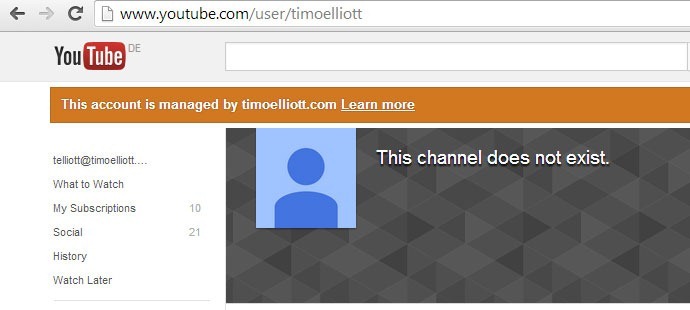Here’s a timely reminder of on some core web principles, such as “algorithms can be stupid” and “don’t rely too heavily on free services”….
Earlier today, I wanted to share a video link to one of my Big Data videos, so went to my channel at youtube.com/user/timoelliott – only to find the following ominous message:

Uh-oh! All my videos gone, unobtainable — what did I do wrong?!
Well, it turns out that your YouTube account is linked to your Google+ account, and something, somewhere went haywire at Google+.
The site suddenly suspected me of “impersonating myself” and suspended my account until I proved my existence, by providing links showing a “significant community that knows you by this name”, an uploaded passport photo, or links or scans of articles.
While I’m waiting for the review, I’m persona non grata on both Google+ and YouTube, waiting for a process that can apparently take days*:

I’m guessing that the culprit is simply an algorithm that checks the application of the Google+ “real name” policy, and decided that my name didn’t sound “real” enough (Yes, Timo is my real first name – it’s Finnish. I’m half Nordic).
In this case, the only “suffering” should be the a few less YouTube videos watched. But as Google and other services become ever-more essential in many people’s lives, it’s a chilling reminder of how much power these companies have – power that will only skyrocket in the future with technologies like Google Glass and face recognition.

The real problem with these procedures is their “delete first, appeal after” nature (doing it the right way around would require much more expensive human intervention – which would disrupt the existing business models, and so isn’t going to happen any time soon).
I’d ask for your help to vouch for me, but there’s no obvious person or link to send such information to. There’s a certain irony in a company that is at the bleeding edge of “customer analytics” being quite so casual with its own customer service (although, of course, I’m more the “product” than the “customer”, since I only “pay” with my eyeballs on ads promoted by the real customers).
Another delicious irony is that even a cursory Google search of my name returns thousands of results (photos, articles, presentations…) that constitute a “proof of my existence” that would be MUCH harder to fake than an uploaded scan of my passport photo:

The moral of the story is “be wary” – especially of “free” services.
Now, I just hope to be able to do a Google Hangout in time for my next SAP Big Data Chat about Data Science…
* UPDATE: Thankfully, it took less than 24 hours: “Hello. Thanks for sending us your appeal. You’re right: your name does comply with the Google+ Names Policy. ”
